-2024届高三英语二轮复习特殊句式课件(共18张PPT)
文档属性
| 名称 | -2024届高三英语二轮复习特殊句式课件(共18张PPT) |
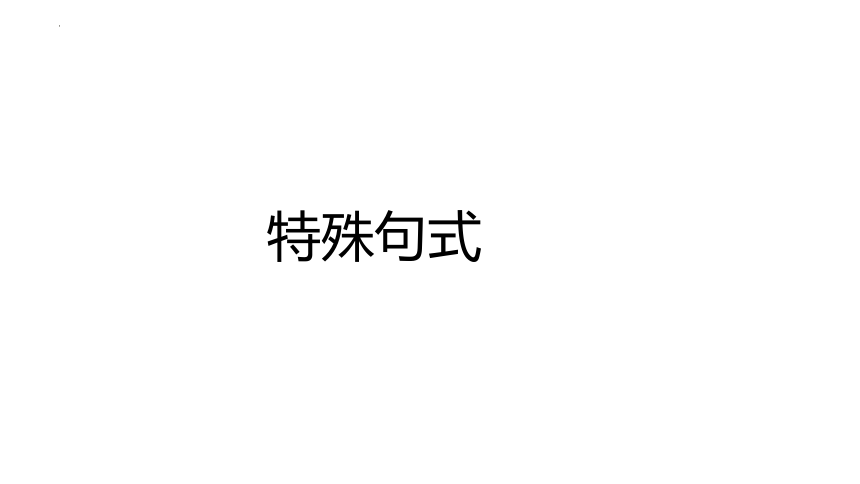
|
|
| 格式 | pptx | ||
| 文件大小 | 99.0KB | ||
| 资源类型 | 教案 | ||
| 版本资源 | 通用版 | ||
| 科目 | 英语 | ||
| 更新时间 | 2023-12-21 00:00:00 | ||
图片预览

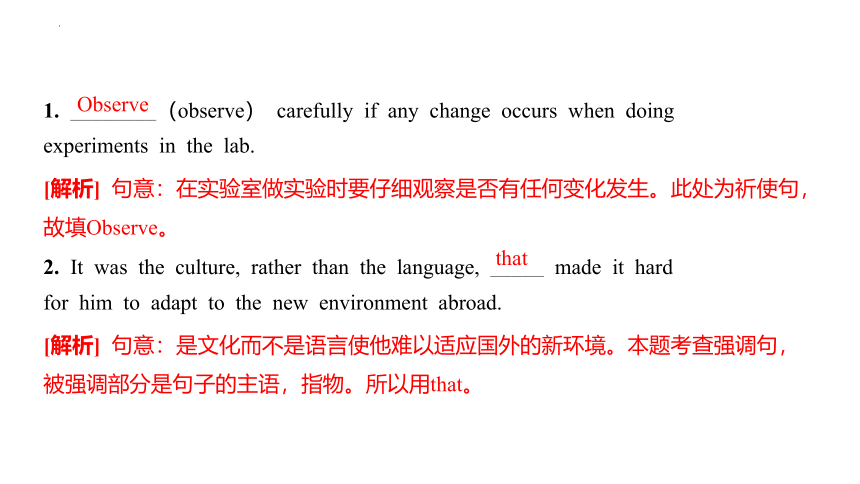
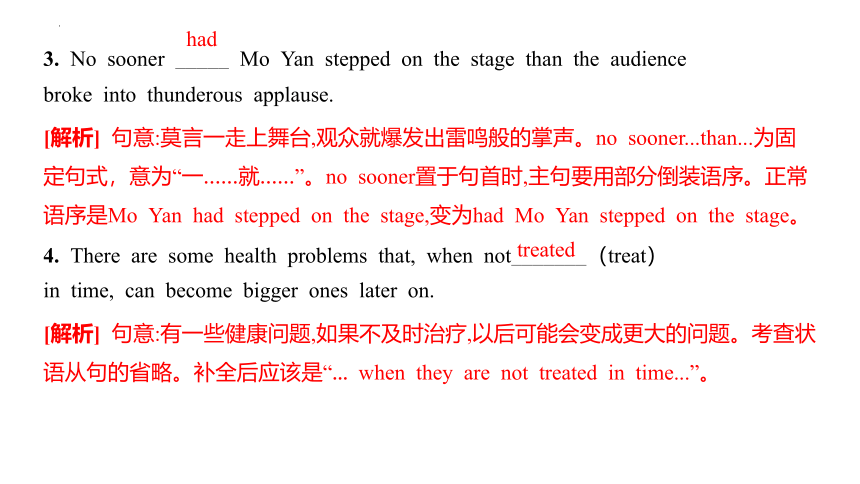
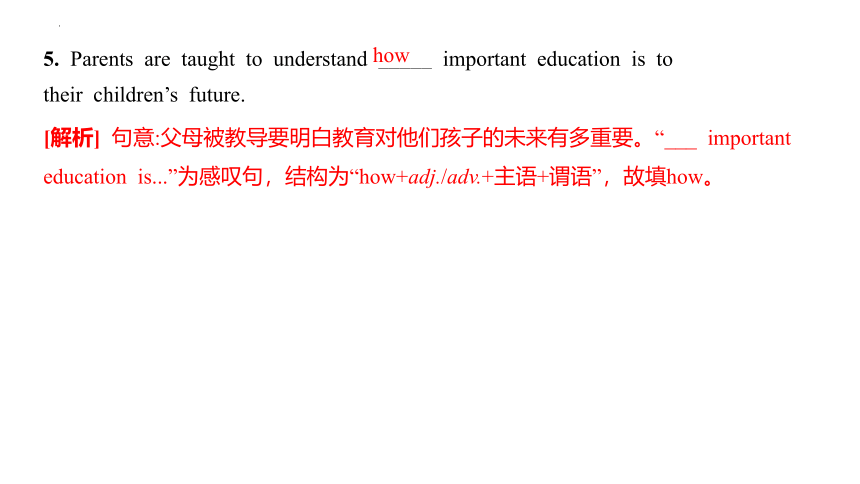
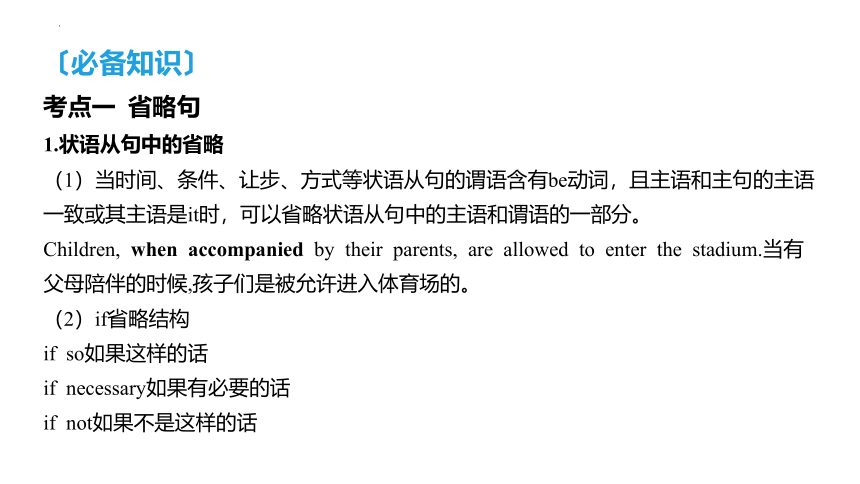
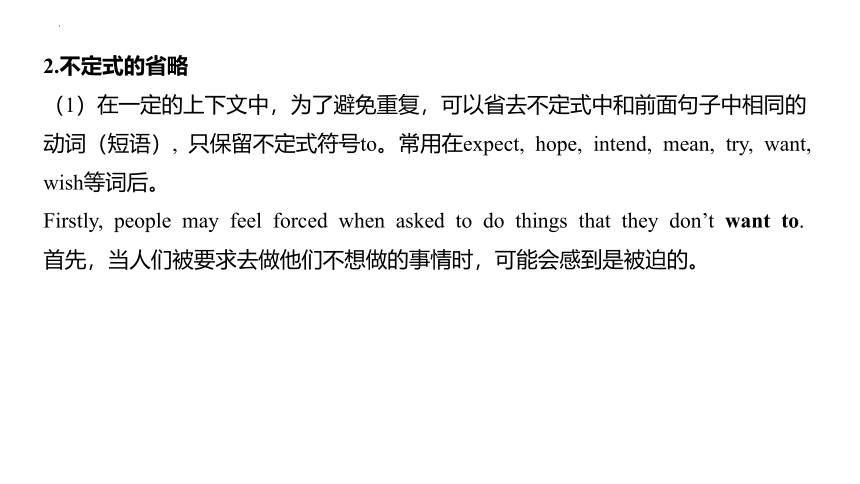
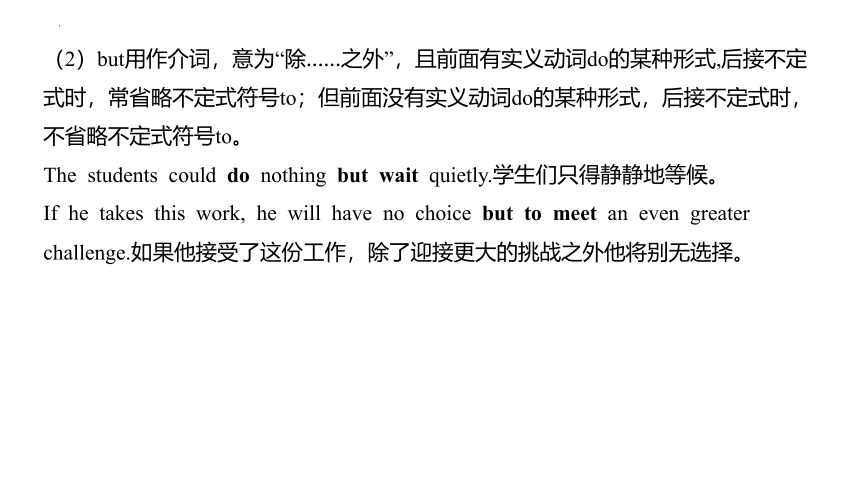
文档简介
(共18张PPT)
特殊句式
1. ________(observe) carefully if any change occurs when doing
experiments in the lab.
Observe
[解析] 句意:在实验室做实验时要仔细观察是否有任何变化发生。此处为祈使句,故填Observe。
2. It was the culture, rather than the language, _____ made it hard
for him to adapt to the new environment abroad.
that
[解析] 句意:是文化而不是语言使他难以适应国外的新环境。本题考查强调句,被强调部分是句子的主语,指物。所以用that。
3. No sooner _____ Mo Yan stepped on the stage than the audience
broke into thunderous applause.
had
[解析] 句意:莫言一走上舞台,观众就爆发出雷鸣般的掌声。no sooner...than...为固定句式,意为“一……就……”。no sooner置于句首时,主句要用部分倒装语序。正常语序是Mo Yan had stepped on the stage,变为had Mo Yan stepped on the stage。
4. There are some health problems that, when not_______(treat)
in time, can become bigger ones later on.
treated
[解析] 句意:有一些健康问题,如果不及时治疗,以后可能会变成更大的问题。考查状语从句的省略。补全后应该是“... when they are not treated in time...”。
5. Parents are taught to understand _____ important education is to
their children’s future.
how
[解析] 句意:父母被教导要明白教育对他们孩子的未来有多重要。“___ important education is...”为感叹句,结构为“how+adj./adv.+主语+谓语”,故填how。
〔必备知识〕
考点一 省略句
1.状语从句中的省略
(1)当时间、条件、让步、方式等状语从句的谓语含有be动词,且主语和主句的主语一致或其主语是it时,可以省略状语从句中的主语和谓语的一部分。
Children, when accompanied by their parents, are allowed to enter the stadium.当有父母陪伴的时候,孩子们是被允许进入体育场的。
(2)if省略结构
if so如果这样的话
if necessary如果有必要的话
if not如果不是这样的话
2.不定式的省略
(1)在一定的上下文中,为了避免重复,可以省去不定式中和前面句子中相同的动词(短语), 只保留不定式符号to。常用在expect, hope, intend, mean, try, want, wish等词后。
Firstly, people may feel forced when asked to do things that they don’t want to.首先,当人们被要求去做他们不想做的事情时,可能会感到是被迫的。
(2)but用作介词,意为“除……之外”,且前面有实义动词do的某种形式,后接不定式时,常省略不定式符号to;但前面没有实义动词do的某种形式,后接不定式时,不省略不定式符号to。
The students could do nothing but wait quietly.学生们只得静静地等候。
If he takes this work, he will have no choice but to meet an even greater challenge.如果他接受了这份工作,除了迎接更大的挑战之外他将别无选择。
(3)在使役动词let, have, make等和感官动词后面作宾补的动词不定式必须省去to。
He will have a worker fix the car.
他会叫一名工作人员修车的。
I could hear him sing loudly.
我能听见他大声唱歌。
考点二 强调句
1.陈述句:It is/was...that/who...(强调人时可用that或who,强调事物时只用that)
一般疑问句:Is/Was it...that/who...
特殊疑问句:特殊疑问词+is/was+it that...
It was when I got back to my apartment that I first came across my new neighbors.正是当我回到公寓的时候,我第一次遇到我的新邻居们。
I wonder what it is that makes you so addicted to the mobile phone.我想知道是什么让你对手机如此着迷。
2.“not...until...”的强调句:It is/was not until...that...
It was not until I came here that I realised this place was famous not only for its beauty but also for its weather.直到我来到这儿,我才知道这个地方出名不仅因为它的美,还因为它的天气。
3.强调谓语动词,用“do/does/did+动词原形”。该结构只用于肯定句,并且只有一般现在时和一般过去时。
He did come to see you last Sunday, but you were out.他上周日的确来看过你,但是你出去了。
考点三 倒装句
完全倒装 表示地点、时间或方向的副词或 介词短语(here, there, now, then, up, down, away, off, in, out, in the room, on the wall 等)置于句首,且主语为名词时 At the meeting place of the
Yangtze River and the Jialing
River lies Chongqing, one of the
ten largest cities in China.在长江和
嘉陵江的交汇处,坐落着中国十大
城市之一——重庆。
部分倒装 表示否定意义的词或短语(never, neither, not, hardly, little, seldom, rarely, at no time, by no means, on no condition, in no case, no sooner等)置于句首时 We laugh at jokes, but seldom do
we think about how they work. 我
们听到笑话时会笑,却很少去考虑它
们是如何让我们发笑的。
only修饰介词短语、副词或状语 从句,且置于句首时 Only after they had discussed the
matter for several hours did they
reach a decision.他们讨论了那个问
题几个小时之后才做出决定。
续表
部分倒装 “so/neither/nor+助动词/be动词/情态动 词+主语”意为“……也是如此/也 不……” Tom likes music. So does John. 汤姆喜
欢音乐。约翰也是。
“not only... but also...”连接并列分 句,not only位于句首 Not only can travelling relax us, but it
can also broaden our horizons. 旅行不仅
可以使我们放松,还能开阔我们的视野。
not until...置于句首时 Not until recently did they encourage
the development of tourist-related
activities in the rural areas.直到近期,他们
才鼓励在农村地区发展与旅游业相关的活
动。
续表
部分倒装 ①so+adj./adv.+助动词/be动词/情 态动词+主语+其他+that...②such+ (a/an)+adj.+n.+助动词/be动词/ 情态动词+主语+其他+that... So beautiful is the tourist
attraction that it appeals to visitors
from all over the world. 这个旅游
胜地非常美丽,吸引了来自世界各
地的游客。
续表
考点四 感叹句
感叹 句 ①What+a/an+adj.+单数可数名词+主语+ 谓语! ②What+adj.+不可数名词/复数名词+主 语+谓语! ③What+a/an+adj.+单数可数名词! What a strange plant! I’ve never
seen it before.
多么奇怪的一种植物啊!我以前从未见
过它。
What terrible problems we would
face!
我们将面临多么严重的问题啊!
①How+adj./adv.+主语+谓语! ②How+adj.(+a/an)+名词+主语+谓 语! ③How+adj./adv.! How beautiful the flowers are!
这些花儿太美啦!
考点五 there be结构
1.there be结构可以有不同的时态,可以和助动词或情态动词连用,并且该结构中的be有时可用 live, remain, stand, lie, exist, seem to be, appear to be, happen to be, used to be等替换。
There have been many great changes in our country since then.
从那时起,我们国家有了很多巨大的变化。
Once upon a time there lived an old fisherman in a village by the sea.
从前,在海边的一个村庄里住着一位老渔夫。
2.there be结构的常考句型:
There is no point/sense (in) doing sth.做某事没有意义。
There is no doubt that...毫无疑问……
There is no need (for sb.) to do sth.(某人)没有必要做某事。
There is no/a possibility of (doing) sth./that...(做)某事没有/有可能性……
This doesn’t mean we are becoming either more or less intelligent, but there is no doubt that the way we use memory is changing.
这并不意味着我们正变得比以前更聪明或是不如以前聪明,但是毫无疑问,我们使用记忆力的方式正在变化。
考点六 祈使句
祈使句常用来表达命令、请求、禁止、建议、警告、劝告等。
1.祈使句的主语一般是第二人称you(常省略,也可不省)。祈使句的否定式一般在动词原形前加don’t或never。祈使句的强调形式可以在谓语动词前面加do。
Do your homework before you watch TV.
看电视之前要先做你的家庭作业。
2.祈使句+and/or+简单句,可以表示假设。
Call me tomorrow and I’ll let you know the experimental result.
明天给我打电话,我会让你知道实验结果。
Start out right away, or we’ll miss the first train.立刻出发,否则我们将要错过首班火车。
特殊句式
1. ________(observe) carefully if any change occurs when doing
experiments in the lab.
Observe
[解析] 句意:在实验室做实验时要仔细观察是否有任何变化发生。此处为祈使句,故填Observe。
2. It was the culture, rather than the language, _____ made it hard
for him to adapt to the new environment abroad.
that
[解析] 句意:是文化而不是语言使他难以适应国外的新环境。本题考查强调句,被强调部分是句子的主语,指物。所以用that。
3. No sooner _____ Mo Yan stepped on the stage than the audience
broke into thunderous applause.
had
[解析] 句意:莫言一走上舞台,观众就爆发出雷鸣般的掌声。no sooner...than...为固定句式,意为“一……就……”。no sooner置于句首时,主句要用部分倒装语序。正常语序是Mo Yan had stepped on the stage,变为had Mo Yan stepped on the stage。
4. There are some health problems that, when not_______(treat)
in time, can become bigger ones later on.
treated
[解析] 句意:有一些健康问题,如果不及时治疗,以后可能会变成更大的问题。考查状语从句的省略。补全后应该是“... when they are not treated in time...”。
5. Parents are taught to understand _____ important education is to
their children’s future.
how
[解析] 句意:父母被教导要明白教育对他们孩子的未来有多重要。“___ important education is...”为感叹句,结构为“how+adj./adv.+主语+谓语”,故填how。
〔必备知识〕
考点一 省略句
1.状语从句中的省略
(1)当时间、条件、让步、方式等状语从句的谓语含有be动词,且主语和主句的主语一致或其主语是it时,可以省略状语从句中的主语和谓语的一部分。
Children, when accompanied by their parents, are allowed to enter the stadium.当有父母陪伴的时候,孩子们是被允许进入体育场的。
(2)if省略结构
if so如果这样的话
if necessary如果有必要的话
if not如果不是这样的话
2.不定式的省略
(1)在一定的上下文中,为了避免重复,可以省去不定式中和前面句子中相同的动词(短语), 只保留不定式符号to。常用在expect, hope, intend, mean, try, want, wish等词后。
Firstly, people may feel forced when asked to do things that they don’t want to.首先,当人们被要求去做他们不想做的事情时,可能会感到是被迫的。
(2)but用作介词,意为“除……之外”,且前面有实义动词do的某种形式,后接不定式时,常省略不定式符号to;但前面没有实义动词do的某种形式,后接不定式时,不省略不定式符号to。
The students could do nothing but wait quietly.学生们只得静静地等候。
If he takes this work, he will have no choice but to meet an even greater challenge.如果他接受了这份工作,除了迎接更大的挑战之外他将别无选择。
(3)在使役动词let, have, make等和感官动词后面作宾补的动词不定式必须省去to。
He will have a worker fix the car.
他会叫一名工作人员修车的。
I could hear him sing loudly.
我能听见他大声唱歌。
考点二 强调句
1.陈述句:It is/was...that/who...(强调人时可用that或who,强调事物时只用that)
一般疑问句:Is/Was it...that/who...
特殊疑问句:特殊疑问词+is/was+it that...
It was when I got back to my apartment that I first came across my new neighbors.正是当我回到公寓的时候,我第一次遇到我的新邻居们。
I wonder what it is that makes you so addicted to the mobile phone.我想知道是什么让你对手机如此着迷。
2.“not...until...”的强调句:It is/was not until...that...
It was not until I came here that I realised this place was famous not only for its beauty but also for its weather.直到我来到这儿,我才知道这个地方出名不仅因为它的美,还因为它的天气。
3.强调谓语动词,用“do/does/did+动词原形”。该结构只用于肯定句,并且只有一般现在时和一般过去时。
He did come to see you last Sunday, but you were out.他上周日的确来看过你,但是你出去了。
考点三 倒装句
完全倒装 表示地点、时间或方向的副词或 介词短语(here, there, now, then, up, down, away, off, in, out, in the room, on the wall 等)置于句首,且主语为名词时 At the meeting place of the
Yangtze River and the Jialing
River lies Chongqing, one of the
ten largest cities in China.在长江和
嘉陵江的交汇处,坐落着中国十大
城市之一——重庆。
部分倒装 表示否定意义的词或短语(never, neither, not, hardly, little, seldom, rarely, at no time, by no means, on no condition, in no case, no sooner等)置于句首时 We laugh at jokes, but seldom do
we think about how they work. 我
们听到笑话时会笑,却很少去考虑它
们是如何让我们发笑的。
only修饰介词短语、副词或状语 从句,且置于句首时 Only after they had discussed the
matter for several hours did they
reach a decision.他们讨论了那个问
题几个小时之后才做出决定。
续表
部分倒装 “so/neither/nor+助动词/be动词/情态动 词+主语”意为“……也是如此/也 不……” Tom likes music. So does John. 汤姆喜
欢音乐。约翰也是。
“not only... but also...”连接并列分 句,not only位于句首 Not only can travelling relax us, but it
can also broaden our horizons. 旅行不仅
可以使我们放松,还能开阔我们的视野。
not until...置于句首时 Not until recently did they encourage
the development of tourist-related
activities in the rural areas.直到近期,他们
才鼓励在农村地区发展与旅游业相关的活
动。
续表
部分倒装 ①so+adj./adv.+助动词/be动词/情 态动词+主语+其他+that...②such+ (a/an)+adj.+n.+助动词/be动词/ 情态动词+主语+其他+that... So beautiful is the tourist
attraction that it appeals to visitors
from all over the world. 这个旅游
胜地非常美丽,吸引了来自世界各
地的游客。
续表
考点四 感叹句
感叹 句 ①What+a/an+adj.+单数可数名词+主语+ 谓语! ②What+adj.+不可数名词/复数名词+主 语+谓语! ③What+a/an+adj.+单数可数名词! What a strange plant! I’ve never
seen it before.
多么奇怪的一种植物啊!我以前从未见
过它。
What terrible problems we would
face!
我们将面临多么严重的问题啊!
①How+adj./adv.+主语+谓语! ②How+adj.(+a/an)+名词+主语+谓 语! ③How+adj./adv.! How beautiful the flowers are!
这些花儿太美啦!
考点五 there be结构
1.there be结构可以有不同的时态,可以和助动词或情态动词连用,并且该结构中的be有时可用 live, remain, stand, lie, exist, seem to be, appear to be, happen to be, used to be等替换。
There have been many great changes in our country since then.
从那时起,我们国家有了很多巨大的变化。
Once upon a time there lived an old fisherman in a village by the sea.
从前,在海边的一个村庄里住着一位老渔夫。
2.there be结构的常考句型:
There is no point/sense (in) doing sth.做某事没有意义。
There is no doubt that...毫无疑问……
There is no need (for sb.) to do sth.(某人)没有必要做某事。
There is no/a possibility of (doing) sth./that...(做)某事没有/有可能性……
This doesn’t mean we are becoming either more or less intelligent, but there is no doubt that the way we use memory is changing.
这并不意味着我们正变得比以前更聪明或是不如以前聪明,但是毫无疑问,我们使用记忆力的方式正在变化。
考点六 祈使句
祈使句常用来表达命令、请求、禁止、建议、警告、劝告等。
1.祈使句的主语一般是第二人称you(常省略,也可不省)。祈使句的否定式一般在动词原形前加don’t或never。祈使句的强调形式可以在谓语动词前面加do。
Do your homework before you watch TV.
看电视之前要先做你的家庭作业。
2.祈使句+and/or+简单句,可以表示假设。
Call me tomorrow and I’ll let you know the experimental result.
明天给我打电话,我会让你知道实验结果。
Start out right away, or we’ll miss the first train.立刻出发,否则我们将要错过首班火车。
